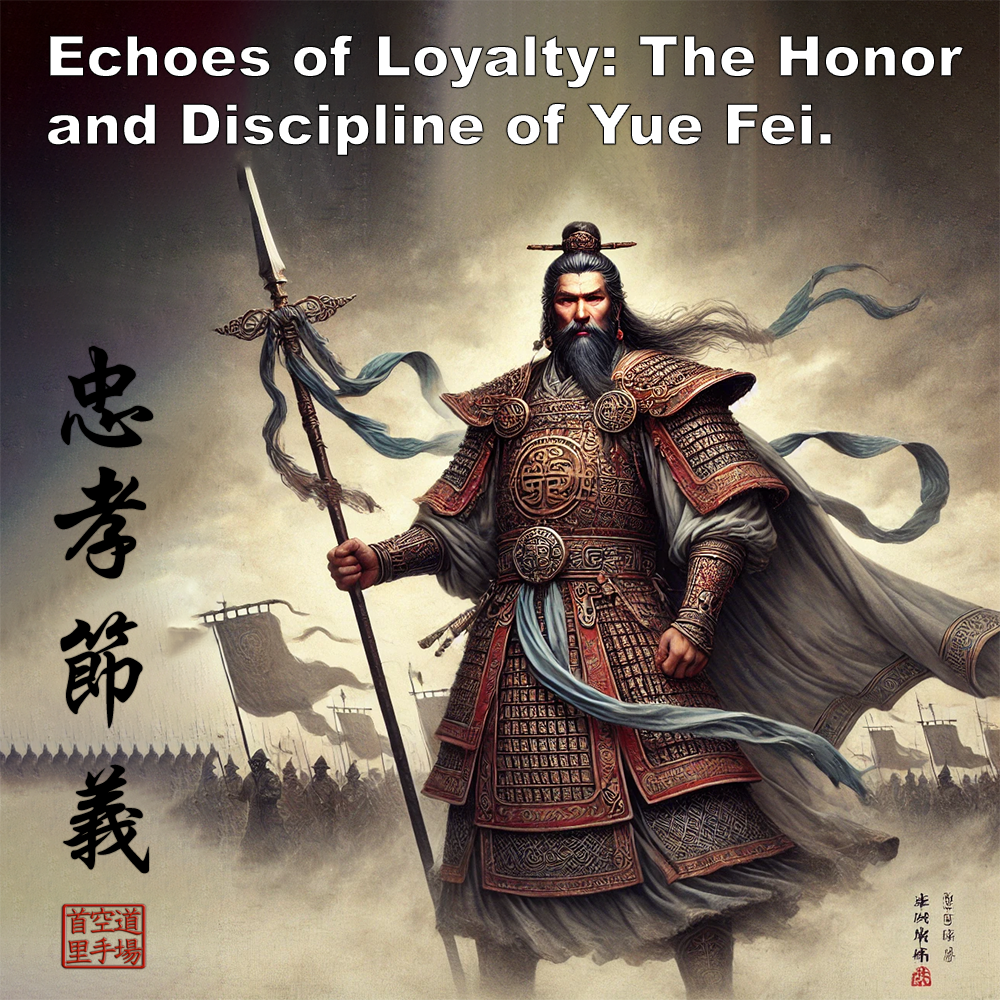
(Approx 2 minute 20 second read)
Yue Fei, a legendary general from the Song Dynasty, is a figure whose legacy resonates across cultures and martial traditions.
.
Though Yue Fei lived in 12th-century China, his story symbolizes universal martial virtues. He is remembered for his loyalty, discipline, and moral integrity – principles echoed throughout the martial arts.
.
Practitioners around the world strive to embody virtues such as respect, perseverance, and humility. These values perhaps create a link between Yue Fei’s legacy and the martial arts, particularly through the principles of ‘忠孝 節 義’ – ‘Chūgō Setsuyoshi’ in Japanese or ‘Zhōng xiào jié yì’ in Chinese – which emphasize loyalty, filial piety, integrity, and righteousness.
.
Yue Fei was executed in 1142 at the age of 39, a tragic end to a life devoted to loyalty and service. He was falsely accused of treason by corrupt officials, including the powerful chancellor Qin Hui, who sought to appease the Jin dynasty and undermine Yue Fei’s military success.
.
The charges were based on fabricated evidence, and Yue Fei’s refusal to abandon his principles led to his imprisonment and eventual execution.
.
Decades later, during the early Ming Dynasty, the injustice of his death was formally recognized. Evidence and historical records revealed the baseless nature of the accusations, and Yue Fei was posthumously exonerated, his reputation restored as a symbol of patriotism and integrity.
.
Okinawan karate has deep ties to Chinese martial arts, particularly those from Fujian province. During the Ryukyu Kingdom period, Okinawa’s tributary relationship with China facilitated cultural exchanges, including martial traditions.
.
Chinese systems significantly influenced the development of Okinawan fighting methods. While Yue Fei is not directly connected to Okinawan karate, the Chinese traditions inspired by his legend, including martial systems like Xingyi Quan, although disputed by many, may have indirectly influenced the broader development of Okinawan martial arts.
.
Yue Fei’s reputed emphasis on simplicity and effectiveness in combat mirrors the pragmatic philosophy of early Okinawan karate, which prioritized straightforward, practical techniques for real-world self-defense.
.
His life story, a blend of historical fact and romanticized legend, also exemplifies discipline, adaptability, and perseverance – qualities that karate practitioners aspire to cultivate through their training.
.
The kata of Okinawan karate serve as a living link to the principles and philosophies brought from China. While there is no evidence that Yue Fei directly influenced these traditions, the strategies and values attributed to him resonate within the martial arts practices passed down through the centuries.
.
The connection between Yue Fei and Okinawan karate is best understood as a shared legacy of values rather than any historical link. His story reminds us of the deeper purpose behind practice: the cultivation of both physical skill and moral character.
.
‘On ko chi shin’ (温故知新) – to study the old to understand the new – captures the essence of this reflection. While the ideas in this article are speculative, they offer a lens through which we can appreciate the enduring influence of figures like Yue Fei on martial traditions and their relevance to our personal journey.
.
Disclaimer: This article reflects my personal thoughts and interpretations on the connections between Yue Fei’s legacy and Okinawan karate. It was inspired by a post written by Patrick McCarthy Hanshi on his Koryu Uchinadi (KU) KSL forum. While rooted in historical themes and cultural exchanges, it is not intended to present definitive historical facts.
.
.
Written by Adam Carter – Shuri Dojo
